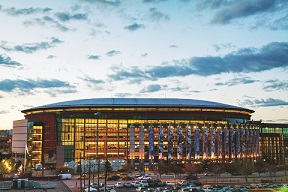When rights holders and facility management collaborate effectively, negotiations are smooth, events are well run and both parties benefit financially.
With the growing amount of tournaments in the youth sports marketplace and the finite amount of inventory our venues have to achieve financial goals, facility operators are being more and more selective of who they rent space to.
Here is what you need to know in order to make your event the most attractive to operators.
Transparency and the willingness to share information are important. Here is some key information that will help set the table for a smooth negotiation process.
How well established is your event? Venues want to know that the event has been run successfully in past and has a dedicated following of teams who participate. If rights holders can show a strong track record of success, the venue will be more interested in booking your event.
Where has the event been held in the past? Venues do communicate and will reach out to previous event venues to get the scoop on your event. How did your event run in the past? Was it a good experience for those involved? Did the rights holder live up to promises and expectations? Would you host this event again if giving the opportunity? Having strong recommendations from previous facilities will certainly help in negotiations.
How much inventory have you needed and how many teams/participants have you had? How much participation are you expecting for the event you are booking? Rental rates are only a piece of the equation for facilities. More participants per playing surface means more heads in beds, more economic impact and more revenue from ancillary services like parking, gate, food/beverage and retail sales for the venue.
What is the format of the tournament? Our favorite rights holders are collaborative in their tournaments formatting and scheduling. Having too much time between games can encourage participants and spectators to leave the venue for lunch, dinner or breaks; too little time means they won’t have time to enjoy the ancillary service in between games. Right holders who schedule in order to encourage participants and spectators to stay in the facility are preferred, as this well help generate more ancillary revenue in food and beverage, retail and entertainment. A rights holder who is willing to schedule games to help maximize ancillary revenues is a great partner for venues.
What insurance and risk management protocols will you have in place for the event? The facility will require you to provide a certificate proving your coverage for the event. What event security and provisions will you make for crowd control, spectator and participant safety? Your contractual duties with the facility may include inspection of the playing surfaces, viewing areas, glass, boards, spectator stands and locker areas.
What references do you have that the venue can contact?
Venues will do their research, but come prepared with a list of references in including previous venue managers, CVB or sports commissions contacts, club directors, coaches, etc.
Its important to note that although a strong history is beneficial in order to getting the venue you want, it’s not necessarily a deal-breaker. Our venues often partner on new events, but won’t expect to hold a large amount of inventory on prime dates on an event that is in its infancy. The most of important piece of this part of the negotiation process is to setting the right expectations with the venue operator. Don’t overpromise. Many venues are rights holders themselves and understand the time it takes to develop a tournament or event.
After you have passed the discovery stage of the process and move into actual rate negotiations, it is important for rights holders to consider the ownership structure of the property. Municipal facilities built for sports tourism may find value in different things than a privately owned, for profit, facility.
Public facilities may find more value in room nights and economic impact then in rental prices. Established events paying less rental could be more valuable that a less established event paying top dollar. That being said, there is a big push toward financial sustainability in the public sector so don’t be surprised if venues are no longer ‘giving away inventory’ in exchange for room night and economic impact. A balanced approach is much more enticing for municipalities.
 |
| Stock photo Aneese |
Private facilities, whether for profit or not, may find less value in economic impact and room nights, and more value in the direct revenue associated with the event. In this case, it’s a good idea for rights holders to continue to work in conjunction with the local CVB or sports commission as they may have a budget to help offset rental costs for a privately-owned venue if it will generate economic impact for the area.
What’s interesting about how sports facilities operate is that it takes a concert of revenue streams to keep them sustainable. No one revenue source can carry the financial burden of owning and operating a facility. Understanding what is important to facilities will be beneficial in the negotiation process.
Rental is one of the highest margin revenue areas for a facility and is a key driver for long-term success. When comparing rental rates, make sure you know what is included. Some facilities are full-service, with rates including scorers’ tables, spectator seating, scoreboards, equipment, gate staff, greeters, digital signage, line striping, marketing assistance, etc. Other facilities may have a lesser rate, but might just unlock the door or gates and walk away, leaving you to arrange all of your staff, supplies and equipment needs.
Retail pricing of rental time is a simple supply and demand equation. But there are many factors that are taking into consideration when deciding on rental rates.
What are the event dates? Holding tournaments in peak tournaments or holiday dates, where there is a high demand for venues and hotel rooms, will be more expensive. Since rates are going to be higher in premium travel and tournament months, consider executing an event in low-demand times when venues and hotels are looking to fill space. This can vary from location to location, so ask the venues if they have any ‘need times’ that you could fill.
Are there multiple events? Packaging multiple tournaments into the same negotiation process can be a big win for rights holders and facility operators. Many venues will be more aggressive with rates if rights holders are willing to bring in multiple events, especially if one of the events will fill some much needed non-peak time in the same calendar year.
Can a multi-year deal be signed? Having dates booked in advance is a plus for facilities. Having guaranteed revenue in the books years out can mean a saving in sales and marketing efforts that can mean savings to a rights holder.
What type of event are you running? Find out what type of events particular venues are looking for. Venues like to diversify their events in order to increase their reach into less developed sports in their venues. For example, if a venue is loaded up with boys’ basketball, they may be willing to make more aggressive deals for sports that they are deficient in so they can gain reach into those sports.
What type of ancillary revenue sources is there? The potential to earn revenue from parking, concessions, gate, entertainment and retail sales is another factor in determine rental prices. It’s important to note that although these sales are crucial to the success of facilities, they don’t equal rental rates dollar for dollar. Revenue sharing is a possibility in all these areas, but it’s important to look for wins for both the venue and the rights holders.
A negotiation between a venue and a rights holder has many moving parts. The best clients are the ones who come to the table and say, “I want to have my event here. How can we make it work for both of us?” Negotiations that start this way usually end with an amicable agreement in which both parties feel ownership in an event. When both parties are fully vested in an event’s success, they end up producing much better financial results for facility operators and rights holders.
